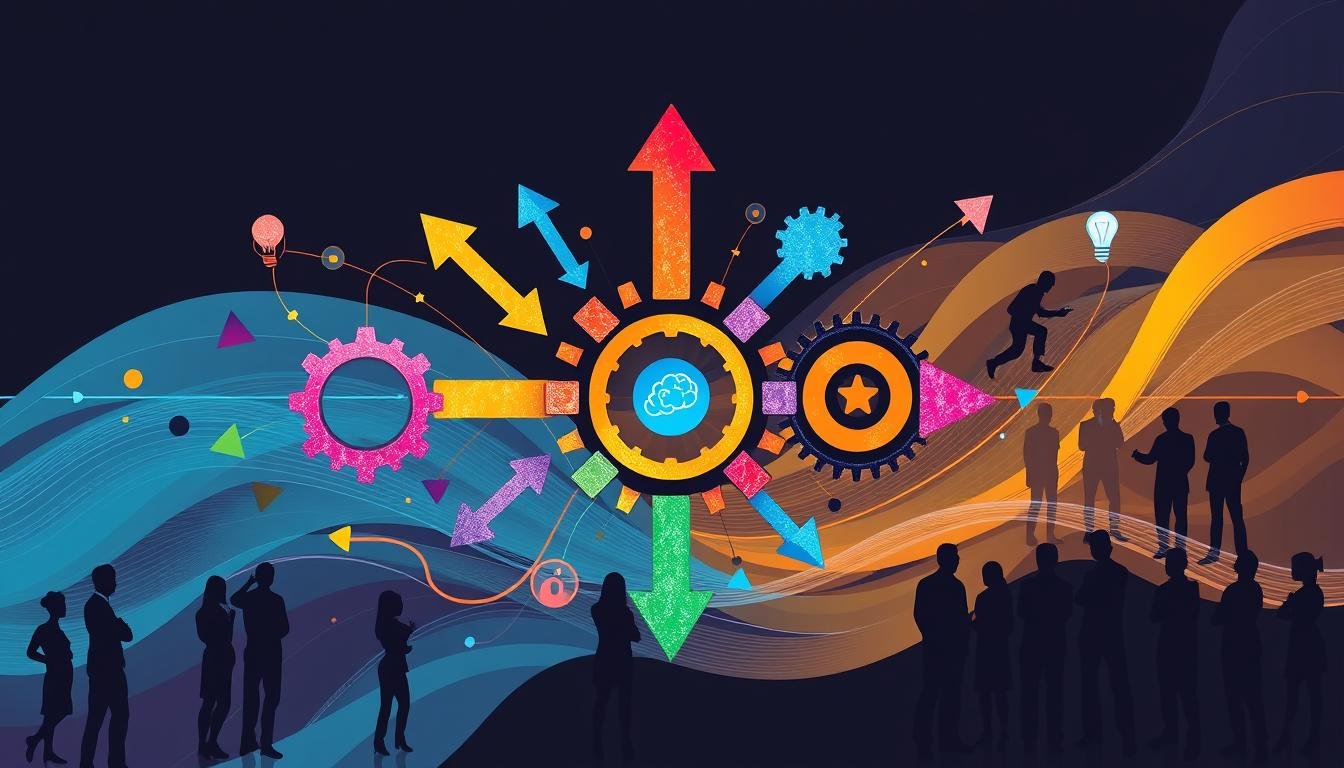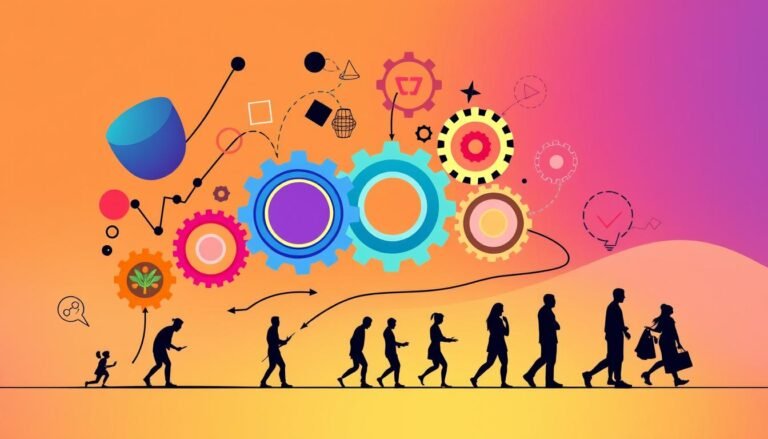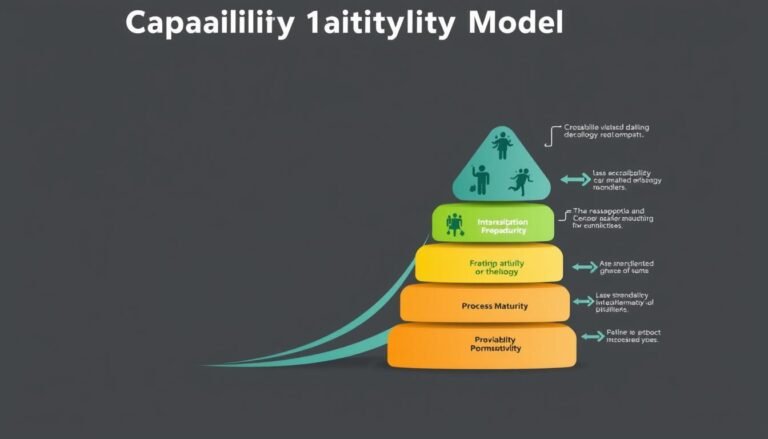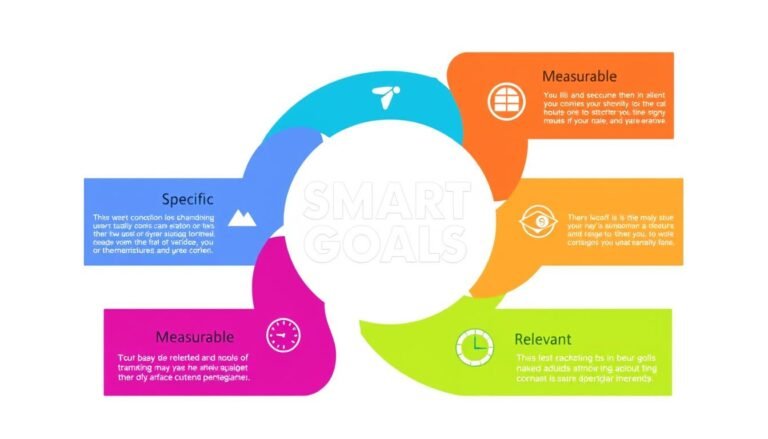Exploring Organizational Learning Theory Essentials
Have you ever thought about why some companies change easily while others find it hard? It’s often because of their approach to Organizational Learning Theory. This theory is about how groups of people work together to get better at what they do. They do this by sharing and using new knowledge.
Staying relevant is key today, and knowing how a Learning Organization works can give you an edge. Companies like Toyota show how good learning strategies can lead to being adaptable and innovative.
This article will cover the main parts of Organizational Learning Theory. We’ll see why it’s important in today’s fast-changing business world. By creating a culture that values learning and using Knowledge Management systems, companies can do well in a changing world. This ensures they don’t just survive but succeed in their fields.
Key Takeaways
- Organizational learning is crucial for adapting to changing environments.
- A learning organization fosters knowledge retention and collaboration.
- Strategies for organizational learning lead to competitive advantages.
- Effective knowledge management systems enhance efficiency and problem-solving.
- Companies like Toyota have successfully implemented these strategies.
Understanding the Fundamentals of Organizational Learning
Organizational learning is key for today’s businesses. By focusing on Training and Development, companies get better at adapting to new markets and tech. This approach keeps employees engaged and boosts overall performance.
The Importance of Learning in Organizations
Learning is vital for a company’s success. Actions like creating, doing, and thinking help share knowledge among staff. This cycle boosts productivity and encourages a culture of Continuous Improvement.
Companies that value learning see happier workers, less turnover, and more profits. They stay competitive and grow strong leaders at every level.
How Organizational Learning Differs from Individual Learning
Organizational learning is different from learning by individuals. It’s about working together for the betterment of the whole. This way, knowledge stays in the company, even when people move on.
Studies show most skills come from real-world experiences, not just training. About 74% of companies now use fun and hands-on learning methods. This makes workers more involved and engaged.
So, focusing on Organizational Development through learning makes companies more competitive and adaptable.
Organizational Learning Theory: Key Components
Understanding Organizational Learning Theory is key to boosting performance and growth in companies. It covers several important parts that help use knowledge well. This is vital for Human Capital Development. Focusing on getting, sharing, using, and keeping knowledge helps create a culture of ongoing improvement.
Knowledge Acquisition
Getting knowledge means looking for information from different places. Companies can do this through workshops, research, and team projects. By making knowledge getting a big part of their plans, companies get better at managing knowledge and improve how they work together.
Knowledge Sharing
Sharing knowledge is key for a team that works well together. It builds trust and openness in the workplace. When employees share what they know, it helps everyone understand better and grows their skills.
Knowledge Application
Using what you know is important for making things better at work. Companies that focus on this use hands-on learning to adapt quickly. This helps them work better and keeps a strong learning culture.
Knowledge Retention
Keeping knowledge safe means saving important info and experiences for later. Good Knowledge Management keeps a company’s knowledge safe. This helps keep things going and helps employees grow by giving them past knowledge to use today.
| Component | Definition | Benefits |
|---|---|---|
| Knowledge Acquisition | Active seeking of new information from various sources. | Improves understanding and fosters innovation. |
| Knowledge Sharing | Exchange of insights among team members. | Cultivates a collaborative and enriching environment. |
| Knowledge Application | Practical implementation of acquired knowledge. | Enhances business operations and adaptability. |
| Knowledge Retention | Systematic capture of critical information. | Prevents loss of valuable knowledge and supports growth. |
The Benefits of Embracing Organizational Learning
Learning within an organization brings many benefits that boost a company’s performance. By focusing on Continuous Improvement, companies create a place where learning and growth happen. This is key to doing well over time. Learning helps everyone grow, making the whole organization better.
Fostering a Culture of Continuous Improvement
Companies that value Continuous Improvement see fewer employees leaving. When workers can easily find knowledge and tools, they’re happier and do better in their jobs. This leads to better work and teamwork.
Enhancing Adaptability to Change
Being able to quickly adapt is crucial today. Learning regularly helps companies change their plans well, making them better at Change Management. Those that focus on learning turn challenges into chances to grow, handling uncertainty well.
Driving Innovation and Problem Solving
Sharing knowledge leads to more innovation and solving problems better. When workers share their challenges, they use their brains together, finding new solutions. Companies like Google and Facebook show how sharing ideas leads to new discoveries.
| Benefit | Description | Impact on Organizational Behavior |
|---|---|---|
| Reduced Turnover | Access to knowledge resources enhances employee retention. | Encourages commitment and loyalty. |
| Higher Job Satisfaction | Empowerment leads to increased confidence and capability. | Promotes a positive organizational culture. |
| Leadership Development | Allows for skill and experience growth over time. | Strengthens succession planning strategies. |
| Improved Innovation | Encourages exploration and sharing of ideas. | Leads to breakthrough solutions and competitive advantage. |
| Enhanced Problem Solving | Increasing dialogue around challenges leads to effective solutions. | Fosters a collaborative atmosphere. |
Embracing organizational learning does more than help individuals. It changes Organizational Behavior, making a culture of flexibility and new ideas. This helps teams do well in a changing business world.
Strategies for Implementing Organizational Learning
Effective organizational learning needs strategic plans. These plans help change how a company handles knowledge. By making a knowledge base, encouraging teamwork, and using technology, companies can grow into strong Learning Organizations.
Creating a Knowledge Base
Having a central knowledge base is key for managing knowledge well. A digital spot where teams can find insights and lessons is crucial. It keeps important info safe and helps with training by giving employees easy access to resources.
Promoting Collaborative Learning Environments
Getting teams to work together boosts engagement and builds a culture of sharing knowledge. Spaces for talking and working together bring out new ideas. This teamwork shows the value of everyone’s input in a Learning Organization, making people feel important and connected to the learning.
Leveraging Technology for Knowledge Management
Technology is vital in today’s world for managing knowledge. Tools like learning systems, sharing platforms, and analytics make info easy to get and improve learning. Using tech in training makes sure employees have the skills needed for the changing job market.
| Strategy | Description | Expected Outcome |
|---|---|---|
| Knowledge Base | Creation of a centralized repository for information | Improved access to knowledge and resources |
| Collaborative Learning | Encouraging teamwork and sharing of ideas | Enhanced problem-solving and innovation |
| Technology Use | Integration of digital tools for knowledge sharing | Streamlined learning processes and efficiency |
Conclusion
In today’s fast business world, Organizational Learning Theory is key. It helps companies grow by focusing on always getting better and being flexible. By using the ideas shared in this article, companies can build a strong plan for growth that keeps learning and sharing knowledge going.
Also, having good team dynamics is crucial, as Larson and LaFasto point out. Teams that work well together can achieve great things. When companies put a big focus on learning, they get better at doing things and come up with new ideas. This puts them ahead in the market.
Using Organizational Learning Theory leads to real change, not just as an extra step but as a must for staying strong and relevant over time. By understanding how people share knowledge and using learning methods, companies can handle the ups and downs of business. This helps them succeed in a world that’s always changing.
Source Links
- What Is Organizational Learning And Why Is It Important?
- No title found
- What Is Organizational Learning and Why it’s Important?
- 10 Powerful Learning Theories in Organisational Behaviour: A Deep Dive
- Cognitive foundations of organizational learning: re-introducing the distinction between declarative and non-declarative knowledge
- Organizational Learning Theory: How Organizations Acquire and Use Knowledge to Improve Their Performance · Eduflow blog
- What is Organizational Learning Theory? | WorkRamp
- Understanding and Embracing Organizational Learning
- The Benefits Of A Learning Organization Culture
- What Is a Learning Organization? +Benefits, Principles (2024)
- Is Yours a Learning Organization?
- How to Co-Create an Organizational Learning Plan – Social Impact
- The Learning Organisation and Health Care Education
- Organizational learning







